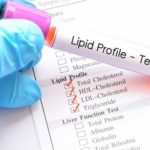
Unlike what most people think, Cholesterol is an essential organic molecule in the body that serves many functions. One of the most important of the functions being its contribution to the membrane structure of every cell in the body. It also synthesizes vital molecules like fat-soluble vitamins and bile acids that help digest your food. But then what makes cholesterol bad to us? To understand this, we need to look at the two main types of cholesterol structures, Low-Density Lipoprotein (LDL) and High-Density Lipoprotein (HDL).
What is a Low-Density Lipoprotein (LDL)?
The Low-Density Lipoprotein constitutes 60-70% of total blood lipoproteins and is responsible for carrying cholesterol particles throughout the body. They are mainly known as the “bad cholesterol” that is often associated with atherosclerosis, or the build-up of plaque in the arteries. The higher the level of LDL in the body, the greater will be the chance of heart diseases. It is important to note that the size of the LDL is less important than the number. The number is represented as LDL particle number or LDL-P.
What is a High-Density Lipoprotein (HDL)?
So what is a High-Density Lipoprotein (HDL)? The High-Density Lipoprotein gets the excess cholesterol present throughout the body and takes it back to the liver, where it can be reused or excreted. It is often referred to as the “good cholesterol” present in the human body as the cholesterol carried by the HDL is known to reduce the chances of heart diseases. This is because of the HDL guard against the build-up of plaque inside the arteries.
One should also know that cholesterol in your diet and the cholesterol in your blood are two completely different things. Our body is able to regulate the amount of cholesterol in the blood by controlling the production of cholesterol within the body. When the dietary intake of cholesterol goes down, our body generates more cholesterol. When there is a high intake of cholesterol, our body produces it.
Yet, in some people, owing mainly to genetics, high cholesterol foods tend to increase blood cholesterol levels. This can be quite risky as high blood cholesterol can trigger many cardiac problems.
How Can We Lower The High Blood Cholesterol Levels?
If you are facing high blood cholesterol levels, you can bring it back to normal by adopting a few lifestyle changes. Even if you find these tips difficult to practice, try doing it nevertheless as the rewards will make you absolutely content. Below are some of those highly effective strategies to bring down your blood cholesterol levels to the baseline:
Avoid Trans-Fats
Trans Fats are basically unsaturated fats that have been modified by a process called hydrogenation. This technique is primarily done to filter out the unsaturated fats in a stable condition. However, the problem arises when there is partial hydrogenation of the oil. The partially hydrogenated trans fats are managed differently in the body than the other fats. The consumption of these types of fats can create a lot of cardiac problems in a person.
One should also note that the labels of foods can be highly misleading when it comes to the nutritional profile. A “0 g trans-fats per serving” does not necessarily mean that it is devoid of trans-fats. This is so because food manufacturers are allowed to run down when the amount of trans-fats serving is less than 0.5 g. To avoid this problem, you can use a trick. Read the ingredients of the food and if it contains ‘partially hydrogenated oil”, it has trans-fats in it and you can avoid it.
Start Working Out
A study on lipids in health and disease found that working out daily reduced the harmful LDL and increased the beneficial HDL. Low-intensity exercise particularly jogging and jumping jacks were found useful in enhancing the HDL levels. You can do exercise like walking, biking or swimming for at least 20 minutes a day to note a decline in blood cholesterol levels. Even though the changes will be modest initially, you should never lose hope and must continue exercising.
Quit Smoking
Cigarette smoking can make your blood cholesterol levels go out of order. Smoking also raises the amount of blood fat called triglycerides which are waxy plaque that gets build-up in the arteries. This can be detrimental to your heart as it raises the risk of blood clots. At the same time, one should realize that smoking is an addiction that cannot be quit instantly. Those who are trying to quit must not lose hope as it can take some amount of time to drop this habit completely. One of the highly effective ways to quit the addiction to smoking is through nicotine replacement therapy. This medical technique gives you a constant and small dose of nicotine throughout the day for helping you to shun the dependency on tobacco slowly.
Cut Down Alcohol Consumption
Binging on alcohol can raise your blood cholesterol levels as alcohol is processed through the same organ which is responsible for making cholesterol. Excessive drinking can shoot up the LDL levels putting your cardiac health at risk. At the same time, there is good news too. Moderate alcohol intake is known to increase HDL levels, which prevents the risk of clogged arteries and heart disease. Here we can say that the problem only arises when you are over drinking. Nevertheless, you should strive to cut down drinking as it can only benefit your overall health.
Lose Weight
Losing a mere 5% of your body weight can significantly lower your blood cholesterol levels. A study had revealed that adults who took part in a 12-week exercise program lowered their LDL by 18 points and their overall cholesterol dropped by 26 points. With a combination of a healthy diet and a regular exercise routine, you can bring down your blood cholesterol levels up to 30%. As far as the diet is concerned, you can consider eating healthy snacks like carrot, apples, and blueberries as they are rich in vitamins. Try switching from bread and pasta to whole varieties as these consist of soluble fibers which play a key role in weight loss.
Having a high blood cholesterol level is not a matter of great panic. You can always bring it back to the normal level if you can tweak your daily lifestyle a little bit. The above strategies will hopefully help you to drop your blood cholesterol levels and attain superb health.
- Climate Change Is Creating a Mounting Health Problem for Millions of People - March 1, 2021
- Use These Handy Tips to Set Up a Wireless Network - April 3, 2020
- Benign Breast Lumps: Causes and When to Call a Doctor - March 27, 2020






